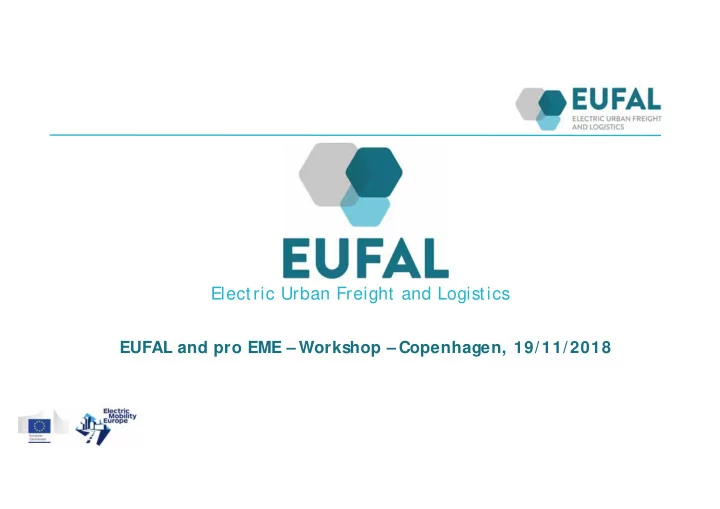

Electric Urban Freight and Logistics EUFAL and pro EME – Workshop – Copenhagen, 19/11/2018
Electric Vans & Delivery Vehicles Renault Kangoo Z.E. (Q: GoingElectric) Streetscooter Work L (Q: streetscooter.eu) Nissan e-NV 200 (Q: heise.de) Streetscooter Work XL (Q: GetMobility)
Technical Capabilities • Range of electric vans and delivery vehicles (standard cycle): • Citroen Berlingo 170 km • Peugeot Partner 170 km • Nissan e-NV200 270 km • Renault Kangoo 270 km • S treetscooter Work 50-80 km • Deployable radius of 120-200 km realistic • Further vehicles announced: • e-S printer 150 km • e-Crafter 173 km
Requirements in companies
Registrations of EVs in Germany • Beginning of 2018: • 54.000 e-passenger cars • 11.000 e-light-duty vehicles
Costs of electric vehicles • Uncertainties in companies concerning EV costs • High procurement costs • Low operating costs not transparent • Cost advantages already given today in use cases • No reliable information available for companies • Declining battery prices, but still high vehicle prices Deutsche Post DHL Group: 8.000 S treetscooter in use - maintenance costs 60-80% lower compared to conventional vehicles
Recommendations for action Companies • should get the possibility to test electric vehicles • need information on cost advantages • can extend the potential of electric vehicles by a change in use patterns • should use fleet management tools for mixed fleets • More supply of suitable electric vehicles is needed
The EUF AL proj ect • The proj ect in short • Obj ectives • The EUF AL platform of exchange • Methodology of the proj ect • EUF AL key results • S cientific work packages • Consortium
The proj ect in short • The proj ect EUF AL (Electric urban freight and logistics) aims at providing a platform of exchange as decision support system for companies willing to integrate electric vehicles (EV) in commercial vehicle fleets. • The platform of exchange will provide tools for companies at different stages of EV implementation – early planning of EV use, implementation of EV use, optimization of the EV implementation.
Obj ectives • To analyze and develop tools as decision support of companies with commercial vehicle fleets • To develop and implement a web-based information and knowledge exchange platform which provides decision support tools • To support companies with information for EV implementations. • To demonstrate the use of the platform of exchange • To demonstrate commercial EV fleets at different levels of development. • To assess and evaluate the developed platform of exchange • To consider user feedback and expert knowledge in the whole proj ect
AL platform of exchange The EUF
EUF AL key results Key Result 1 – EUF AL Platform of Exchange An integrated Platform of Exchange incl. a Demo Version, Key target group: fleet operators and transport companies Key Result 2 – Knowledge S upport for Policy Deeper scientifically proved knowledge for policy support, Key stakeholders: policy makers Key Result 3 - S cientific Knowledge, Analysis & S upport Key users: scientific community, fleet managers and operators
cientific work packages S
AL Consortium EUF
Aim of the workshop • Input for the proj ect • Which information is available to fleet managers? • Which information is needed for the shift to electric mobility? • Where can the EUF AL platform support companies • Input for the participants • Get to know about best practices in commercial EV use • Learn more about TCO calculation for EV • Get information on how to support the shift to electric mobility
Thank you for your attention! Contact: Coordinator: DLR Institute of Jens Klauenberg / DLR Transport Research Jens.klauenberg@ dlr.de www.eufal-proj ect.eu The proj ect EUF AL is funded by the ERA-NET Cofund Electric Mobility Europe (EMEurope). EMEurope is co-funded by the European Commission within the research and innovation framework programme Horizon 2020 and national and regional funding organizations (Proj ect No. 723977). www.eufal-proj ect.eu
Recommend
More recommend